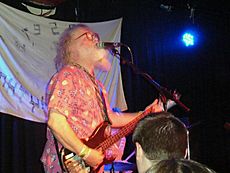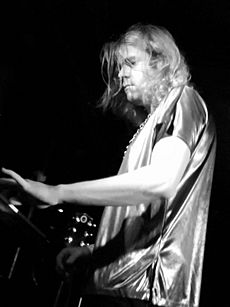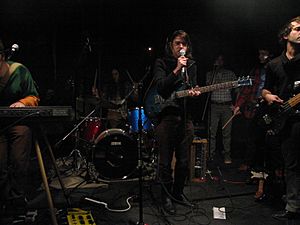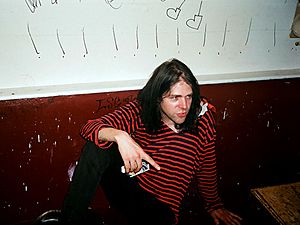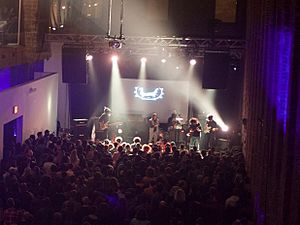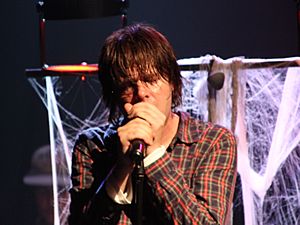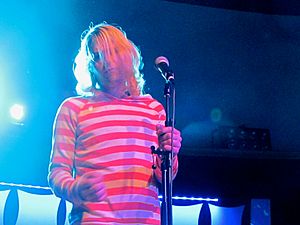Ariel Pink facts for kids
Quick facts for kids
Ariel Pink
|
|
|---|---|
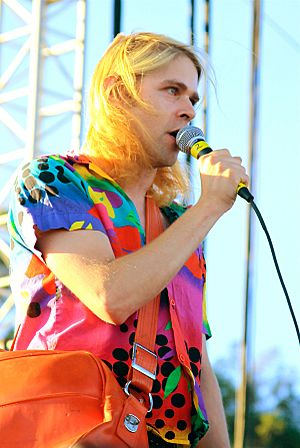
Ariel Pink performing in 2010
|
|
| Background information | |
| Birth name | Ariel Marcus Rosenberg |
| Born | June 24, 1978 Los Angeles, California, U.S. |
| Genres | |
| Occupation(s) |
|
| Instruments |
|
| Years active | 1996–present |
| Labels |
|
Ariel Marcus Rosenberg (born June 24, 1978), known as Ariel Pink, is an American musician, singer, and songwriter. His music often sounds like popular songs from the 1960s to the 1980s. He is known for his "lo-fi" style, which means his music sounds like it was recorded at home with simple equipment. This style became very popular and influenced many independent musicians starting in the late 2000s.
Ariel Pink is often called a "godfather" of music styles like hypnagogic pop and chillwave. He helped start a trend where artists used sounds and old technologies from past decades. He also encouraged people to appreciate both "high art" (like classical music) and "low art" (like pop music) in independent music.
Born in Los Angeles, Ariel Pink started recording songs on an eight-track tape recorder when he was a teenager. He was influenced by artists like Michael Jackson, the Cure, and R. Stevie Moore. Most of his music was recorded between 1996 and 2003, during which he made over 200 cassette tapes of songs. Many of his albums released in the 2000s were actually recorded before 2004. In 2004, he released The Doldrums, House Arrest, and Worn Copy on Animal Collective's Paw Tracks label. These albums quickly gained a small but dedicated group of fans.
In the 2000s, Ariel Pink's unique sound led to new discussions about "hauntology" in music, where he was a key figure. Until 2014, his records were usually credited to Ariel Pink's Haunted Graffiti. This was his solo project, sometimes confused with his touring band. His fame grew after he signed with 4AD and released his 2010 album Before Today, which was his first album recorded in a professional studio. He then released three more albums: Mature Themes (2012), Pom Pom (2014), and Dedicated to Bobby Jameson (2017).
Ariel Pink has sometimes caused controversy with his comments in interviews or on stage. In 2021, he lost support from his record label, Mexican Summer, after he was in Washington D.C. during the January 6 Capitol attack. After this, he formed a new band called Ariel Pink's Dark Side. They have released two albums: The Key of Joy Is Disobedience (2022) and Never Made A Demo, Ever (2023).
Contents
Early Life and Music Interests
Ariel Marcus Rosenberg was born in Los Angeles on June 24, 1978. His parents, Mario and Linda, divorced when he was two years old. His first language was Spanish.
Ariel's parents encouraged him to draw and paint, thinking he might become a famous artist. His mother also wanted him to try acting. Ariel described himself as a "difficult" child who preferred to play by himself.
When he was young, Rosenberg loved collecting records and reading music magazines. He especially enjoyed finding rare recordings of his favorite artists. He first became interested in music by watching MTV. His interest grew, and he particularly liked Michael Jackson. In junior high, he started listening to metal bands like Def Leppard and Metallica. Later, he enjoyed "death rock" groups such as Bauhaus and the Cure, which became his favorite band. He also liked Lou Reed and the writings of music critic Nick Kent.
Ariel lived in Louisiana with his mother for a while. He faced bullying in junior high, so his parents sent him to live with cousins in Mexico City for a year. There, he discovered the Cure. When he returned to Los Angeles, he attended Beverly Hills High School. He became interested in the goth style and stopped following new music. He felt that after bands like Nirvana, popular music stopped progressing.
First Recordings (1996–2003)
While in high school, Rosenberg started writing songs and creating experimental music in his father's garage. He used a portable cassette recorder, a bass guitar, an amplifier, and even kitchen utensils. In 1996, he began an eight-year period of intense recording, where he felt like his life depended on it. He was very interested in krautrock music at this time. He used different names for his tapes, including "Ariel Pink's Haunted Graffiti." He didn't plan to release any of this music to the public.
In 1997, Rosenberg studied fine art at the California Institute of the Arts. He wasn't happy with the school's focus on the art market. There, he met John Maus, who became his best friend and roommate.
His album The Doldrums (2000) was recorded during his last semester at the university. He described it as the "saddest record" he could make. For his final exams, he sold CDs of The Doldrums from a kiosk, as a way to criticize the school's focus on marketing.
Rosenberg became a big fan of the lo-fi musician R. Stevie Moore after hearing his music. He contacted Moore in 1999 and sent him a CD of The Doldrums. Moore was very impressed by Ariel's unique music. Ariel said that getting an email from Moore was one of the most exciting things that had happened to him.
After leaving CalArts, Rosenberg lived in a Hindu ashram in Crenshaw, Los Angeles. He also went to music school and worked at a record store. During this time, he recorded several more albums, including Scared Famous (2001), House Arrest (2002), and Worn Copy (2003). By the mid-2000s, he had made between 200 and 300 cassette tapes of music. He stopped writing and recording music for several years after 2004.
Working with Labels and Touring
Paw Tracks Albums and the Haunted Graffiti Band
In the summer of 2003, Rosenberg gave a CD of his album Worn Copy to the band Animal Collective. They had just started their own record label, Paw Tracks. Animal Collective listened to the album and were amazed. They decided to release his music on their new label. Ariel suggested they release The Doldrums instead, which he thought was his least commercial album. They eventually agreed.
In October 2004, Paw Tracks released The Doldrums. This was the first time Ariel Pink's home recordings were widely available, as only his friends and family had heard them before. After this, Ariel Pink became much more known. He started going on concert tours to promote his music. His first live shows were just him singing over pre-recorded tracks. When he opened for Animal Collective in 2004, he decided to form a full band. His early performances were not always well-received, and he admitted he wasn't a very good live musician at first. In 2005 and 2006, Paw Tracks reissued two more of his earlier recordings, Worn Copy and House Arrest. These albums helped him gain a loyal group of fans.
Almost all of Ariel Pink's music released in the 2000s was written and recorded before 2004. Instead of making new music, he spent the second half of the decade touring and looking for another record label. Between 2006 and 2008, smaller labels released four more of his albums: Underground (1999), Lover Boy, and the collections Scared Famous (2007) and Oddities ... Vol. 1 (2008).
In 2006, Pink went on some tours and put together a band with friends like John Maus. In 2007, Pink and Maus also played with Animal Collective's Panda Bear on his European tour. In 2008, Pink formed a more stable touring band. Bassist Tim Koh said that Ariel's music was "the most difficult music I've ever tried to play."
Later, Rosenberg explained that "Ariel Pink" was not a fake name or character. He said the confusion started because promoters billed his early shows as "Ariel Pink" with a band called "Haunted Graffiti." He said his name is Ariel Rosenberg, and his solo project was called Ariel Pink's Haunted Graffiti. He was the only band member to appear on all four of his albums released in the 2010s.
Before Today, Mature Themes, and Pom Pom
After signing with 4AD, Rosenberg and his band recorded Before Today. This was his first album made in a professional studio with a producer and engineer. He called it his first "official" album, made with the idea that he had an audience. Some songs on it were written years earlier. Making the album was difficult, and some band members even briefly quit.
Released in June 2010, Before Today was very well-received by critics. It even reached number 163 on the Billboard 200 music chart. Critics noted that the "lo-fi" sound from his earlier recordings was less noticeable, and the songs were carefully arranged. The album appeared on many "best of 2010" lists, and its main song, "Round and Round", was named the best track of the year by Pitchfork.
In 2011, Pink released a 16-minute song called "Witchhunt Suite for WWIII" to remember the 10th anniversary of the September 11 attacks. In April, he had a difficult performance at the Coachella music festival, causing feedback and refusing to sing. He later explained that the band had changed their setup without asking him.
Pink had trouble keeping his band together. In 2012, there was a disagreement with drummer Aaron Sperske, which led to a lawsuit. Pink announced on Facebook that the Haunted Graffiti band was over. They reached a settlement in court in 2013.
Mature Themes, the album after Before Today, came out in August 2012. The songs on this album were newly written. Some critics thought its more playful and funny tone was meant to surprise new fans. It reached number 136 on the Billboard 200 chart. Pink sometimes called it a "breakup album." His ex-girlfriend Geneva Jacuzzi appeared in the music video for "Only in My Dreams."
In November 2014, 4AD released Pom Pom, which reached number 150 on the Billboard 200. This was Pink's first album without "Haunted Graffiti" in the credit, and his last with 4AD. Many songs were written with collaborators like Kim Fowley. Other songs were reworked from his earlier self-released recordings. Pink said he removed the "Haunted Graffiti" credit to make the album feel special.
Bobby Jameson and Remastered Albums
After Pom Pom, Pink worked with many other musicians, including Weyes Blood, Sky Ferreira, and MGMT. Pink and Weyes Blood released a joint album called Myths 002 in January 2017.
Dedicated to Bobby Jameson, released in September 2017, was Pink's first solo album on the Mexican Summer label. Unlike Pom Pom, it was recorded with a small group of people at his home. The album reached number 193 on the charts and received good reviews. In interviews, Pink talked a lot about the musician Bobby Jameson. In November 2018, he announced that a show would be his last with his band.
In 2019, Mexican Summer announced they would release new, improved versions of Pink's original Haunted Graffiti albums. They also planned to release collections of his unreleased music from 1999 to 2018. These new versions fixed recording mistakes from earlier releases. The label planned to release these albums in parts, starting in October 2019.
Ariel Pink's Dark Side (2021–Present)
In a December 2020 interview, Pink suggested he might not release another album because of current events. The next month, he went to Washington D.C. and attended a rally that happened before the storming of the Capitol. Pink stated he was there to "peacefully show his support" and returned to his hotel after the rally. Two days later, his record label, Mexican Summer, announced they would no longer work with him. Pink later appeared on a TV show, saying he was struggling without label support.
In August 2021, Pink announced a new album, The Key of Joy is Disobedience, credited to "Ariel Pink's Dark Side." He recorded it with producer Nick Noto and other musicians. The first song from the album, "Horse-Head Mother," was released in February 2022. The full album was released on vinyl in August 2022. Another song, "Chupacabra," was released in October.
In late October, Never Made A Demo, Ever was released digitally. This album contains over an hour of new music recorded by the band. In August 2023, the song "I Wanna Be A Girl" from the album was released.
Music Style and Influence
How Ariel Pink Makes Music
Ariel Pink's music includes many different styles, sometimes even in the same song. He often takes a modern approach to pop music. His early recordings mixed lo-fi (low-fidelity, meaning it sounds like it was recorded simply at home) psychedelic pop with sounds from 1980s soft rock and classic California pop. He once said his early records were like a collection of "everything good about music." His music often uses sounds from 1970s radio, the unique style of Frank Zappa, and the cool energy of New Wave. The "lo-fi" sound is a key part of his music. Pink believes his music is heavily influenced by 1960s pop but doesn't fit into just one genre.
His early songs were recorded simply on an eight-track cassette recorder. Since he wasn't a skilled musician on every instrument, he usually recorded each part one at a time. Using cassettes gave his music a distinct lo-fi sound, which he later chose to keep as part of his style. He tried recording in professional studios, but he didn't like the results. He also said he is "not a poet" and sees his work as "musical pieces" rather than just songs, with the lyrics often added later.
When his music was re-released by Paw Tracks, Ariel Pink was seen as an unusual artist. At the time, few other independent artists had a similar retro lo-fi sound. Music critic Simon Reynolds noted that before Pink, lo-fi artists usually disliked the polished sound of 1980s rock, which Pink was inspired by. In 2014, Pink described his artistic goal as staying in a forgotten era, "somewhere in the forgotten '90s and '80s," to see what happens when you try to "pause time." In 2017, he said his work was a "weird art experiment" to see what would happen if he kept making music similar to the Cure. Other musicians who became fans of Ariel Pink's music include John Maus, Kurt Vile, and Beck.
R. Stevie Moore, a musician Ariel Pink admired, said that while they shared similar ways of making music, Ariel Pink didn't sound exactly like him. Ariel Pink often praised Moore in interviews to help him get more recognition.
Influence on Music Trends
During the late 2000s, Ariel Pink was mentioned in early discussions about "hauntology" in music. This idea describes music that feels like a ghost or memory of the past. His emergence helped bring this discussion back. In 2009, journalist David Keenan used the term "hypnagogic pop" to describe a new trend of lo-fi music that used cultural nostalgia, childhood memories, and old recording technology. Ariel Pink was one of the artists he mentioned. Music critic Simon Reynolds also used the term and called Pink a "godparent" of this style.
Reynolds compared Ariel Pink's influence to how My Bloody Valentine influenced the shoegaze genre. He wrote that the sound Pink created—"70s radio-rock and '80s new wave as if heard through a defective transistor radio"—was so unique that it became a strong influence on others. This sound became especially linked to Pink after his 2010 album Before Today became successful. That year, Pitchfork writer Mark Richardson said that even though Pink's early records didn't reach many people, those who heard them were inspired to start their own home recording projects. This led to many new lo-fi bands appearing, and they often talked about Pink's influence.
Uncut magazine called Pink a "lo-fi legend" whose "ghostly pop sound" influenced "chillwave" artists like Ducktails. Jeff Weiss of Pitchfork said The Doldrums "inspired chillwave and a lo-fi revival." Spin writer David Bevan said Pink's interest in old media helped start a trend seen in many blogs and apps that use old VHS or Polaroid camera styles. Sam Goldner of Vice suggested that Pink's use of "cheesy older sounds" influenced vaporwave music. He added that in the early 2010s, Pink and musician Grimes helped create a new way of thinking in independent music, where "high" and "low" art were seen as equally important.
Pink himself said he never claimed to be the "godfather" of "lo-fi," "hypnagogic pop," or "chillwave." He thought people were just having fun with ideas. In a 2012 interview, he said that while he didn't intend to create nostalgia, he knew his music sounded like a "trace of a memory you can't place." He also said in 2011, "I know I've left my mark already. I know when somebody's heard my music. I can hear it in their music."
Influences
Ariel Pink has said his music is influenced by these artists:
- Anthrax
- Bauhaus
- Cabaret Voltaire
- Can
- Christian Death
- The Cure
- Deicide
- The Dukes of Stratosphear
- Entombed
- Fleetwood Mac
- Hall & Oates
- Michael Jackson
- Morbid Angel
- Def Leppard
- Metallica
- R. Stevie Moore
- Lou Reed
- Todd Rundgren
- Sepultura
- Steely Dan
- Throbbing Gristle
- Frank Zappa
Selected Discography
|
Studio Albums
|
Compilations
|
See also
 In Spanish: Ariel Pink para niños
In Spanish: Ariel Pink para niños
 | Lonnie Johnson |
 | Granville Woods |
 | Lewis Howard Latimer |
 | James West |


